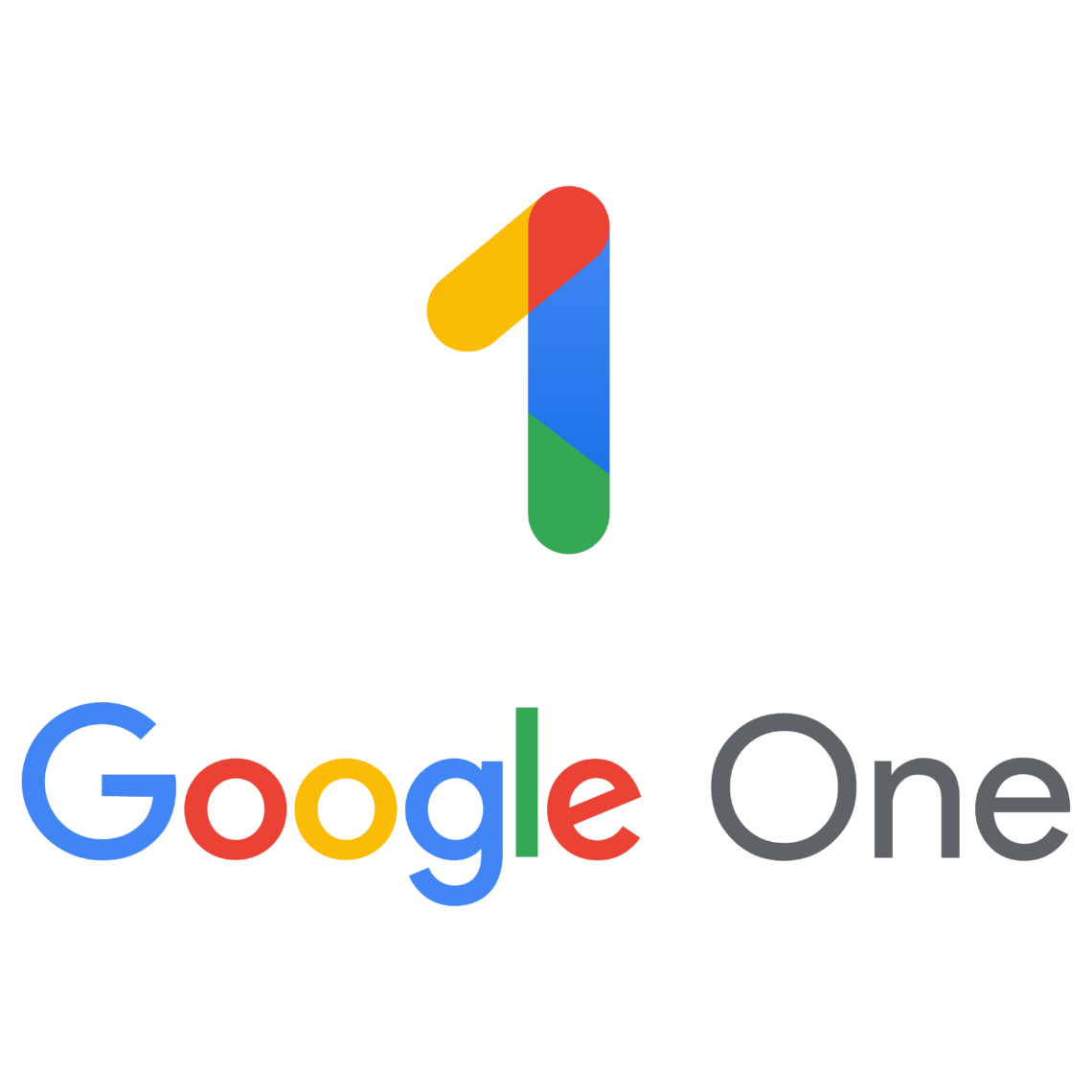Google One VPN Review (2024): Basic VPN From a Tech Giant
Google One VPN is limited in its capabilities as part of the Google One cloud storage premium plans. You must purchase at least 2 terabytes (TB) of Google One cloud storage, priced at $99 per year or $9.99 per month, to gain access to the VPN. It’s not sold separately.
Google One VPN may work for users interested in 2TB of cloud storage and only basic VPN features, but those needing stronger privacy protections should look elsewhere. We recommend NordVPN for the best online privacy.
If Google expands its capabilities, this fledgling VPN does show promise. However, with its current limitations and Google’s history of privacy issues, is this VPN really worth the cost? In this Google One VPN review, we’ll see whether this new VPN from arguably the biggest tech company in the world is worth using.
Google One VPN Review – Short Review
| 💵 Price | From $1.67 per month |
| 📱 Operating systems | iOS, Android |
| 💻 Connections | 6 |
| 💳 Payment methods | PayPal, Credit card |
| 🔒 Protocols | Google Proprietary |
| 📥 Torrent options | Not specified |
| 📅 Money-back guarantee | None Offered |
| 📋 Logs | Connection Logs |
What We Like
- Easy to set up and use
- Free with Google's premium Google One storage plans
- Split tunneling
- Kill switch
- Dark web monitoring
What We Don't Like
- Can't be bought separately
- Only available in 18 countries
- Only one VPN protocol
- No VPN server location list
- Google's history of privacy breaches
- Blocks many streaming service providers
During our testing, we found that Google One VPN’s speeds are acceptable for normal browsing, but its unblocking capabilities are not strong enough for popular streaming platforms. Plus, Google does not specify that the VPN offers torrenting protection, which is concerning, especially for those who frequently use P2P file sharing.
The VPN by Google One has several limitations and doesn’t stand up to other big-name competitors like NordVPN. Between its limited number of servers, lack of compatibility with major streaming options, and iffy privacy history, the Google One VPN isn’t the best VPN option on the market. However, there’s still something to be said about this VPN’s simplicity of setup and ease of use.
Speeds – How Fast Is Google One VPN?
At VPNOverview, we test every VPN for speed, specifically to determine at what rate your connection speed might decrease when the VPN is in use. We start by showing you some speed tests we performed to determine any significant decreases in speeds with or without using Google One VPN. Next, we outline our daily use experience to give you a real-world example of what you can expect with this VPN.
Before we dive into the actual speed test, we wanted to share our overall experience with the VPN by Google One in regards to its speed.
Here are our top findings:
- We did not notice a major amount of latency while browsing the internet and streaming YouTube videos in 1080p.
- While the Google One VPN is fast enough for everyday use, speed tests show that it still throttles your connectivity significantly.
Speed test results
During our testing, we reviewed our internet speed both with and without the VPN. The VPN by Google One does not allow you to select from a list of servers. Instead, the VPN automatically assigns the user to a different server each time a secure connection is established.
We connected to the VPN numerous times to discover as many locations as we could, but we could not reach a server outside of the United States. The three locations that the Google One VPN connected us to were in Wichita, Kansas, Council Bluffs, Iowa, and Chicago, Illinois. These cities were close enough to our testing location in Indiana to provide fast enough speeds for decent web browsing, but we were unable to compare these servers with more distant ones.
| Location | Download speed (MBPS) | Upload speed (MBPS) | Ping (MS) |
|---|---|---|---|
| Indianapolis, IN (No VPN) | 44.42 | 4.21 | 32 |
| Wichita, KS | 36.63 | 5.22 | 54 |
| Chicago, IL | 8.85 | 2.84 | 26 |
Without the Google One VPN, our base download speed from Indianapolis was 44.42 Mbps, an upload speed of 4.21 Mbps, and a ping of 32 ms.

While the VPN was activated, the highest download speed we got was 36.63 Mbps, an upload speed of 5.22, and a ping of 54 ms. The VPN automatically connected us to a server in Wichita, Kansas.
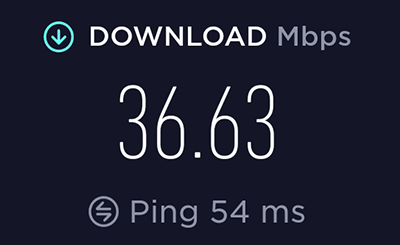
Our lowest test results gave us a download speed of 8.85 Mbps, an upload speed of 2.84 Mbps, and a ping of 26 ms. We wanted to note that this was an outlier among our speed tests where the next lowest speed was recorded at 25.95 Mbps.

As you can see, the VPN’s speeds varied widely. Unfortunately, the VPN by Google One did take quite a major bite out of our connection speed, and we were at the mercy of the automated server selection mechanism each time we used the VPN.
Speeds during daily use
When using Google One VPN for regular browsing, we noticed a moderate drop in speed. However, this did not severely affect browsing the web, sending emails, or even watching YouTube videos in 1080p. We had uninterrupted internet access while we conducted our everyday activities, free of issues causing slow speeds or dropped connections.
Overall, the VPN by Google One did okay in terms of speed. But due to the lack of server locations and the inability for the VPN to get around streamer’s proxy detection systems, we could not run our conventional streaming, torrenting, and gaming tests, so it does lose points there.
Safety – Is the VPN by Google One Secure and Private?
Google is headquartered in the United States, which can cause some issues for users when it comes to privacy. This is because of the US government’s sweeping surveillance powers, no matter how trustworthy the VPN company or its product might actually be. Jurisdiction is one of the most important factors when selecting VPN services for online security purposes, and it’s best to sign up for a more secure VPN based in a country lacking mandatory data retention laws, such as ExpressVPN (British Virgin Islands) and NordVPN (Panama).
Before we began reviewing Google One VPN, we were concerned about the company’s reputation in the area of security. With Google’s known tracking and marketing policies, would their VPN really offer users substantial security? The answer is not really. After examining the VPN’s features and documentation thoroughly, we came to the conclusion that its approach to security is just as questionable as Google’s own. Here is a summary of our findings:
- Google is very secretive about its encryption and only states that they use a proprietary VPN protocol to secure their customers’ internet traffic.
- Google states in its white paper that it does record aggregate datasets, but some key identifying information like IP addresses and network traffic are not logged.
- A kill switch option is available.
- Payments for the VPN by Google One are traceable since they do not accept anonymous cryptocurrency payments.
- A Google One cloud storage service subscription is required to gain access to the VPN. This means Google has to have access to even more of your data in order to use the VPN.
- Google One comes with dark web monitoring.
Protocols
The only VPN protocol that Google One VPN uses is its own proprietary protocol. At this time, Google remains silent on the details. The industry-standard OpenVPN protocol is not available, but the company has announced its plans to eventually provide support for IPsec in the near future, and others in the long term. Google also states that its in-house protocol is created with open-source code that will be independently audited by third parties at some point, but Google did not specify when.
Logging and privacy
Privacy is a big concern with the VPN by Google One since Google already has a lot of data on you. By enabling the Google One VPN, you run all of your online activities through Google’s servers. While Google continues to hold fast to its commitment to protecting each users’ privacy, the company’s reputation and the sheer amount of personal data they keep on its users makes us question that commitment.
In this review, we not only reviewed the company’s policies but also its overall security, and tested for IP address leaks and DNS leaks using industry-standard tests. We do take issue with their privacy policy but found no indication of IP or DNS leakage.
In March 2023, Google One announced support for dark web monitoring for all premium users.
Logged data by Google One VPN
Google states that they will never use the VPN connection to track, log, or sell your browsing activity, though they end up logging some user data for diagnostic and quality purposes. This is a common practice for many of the top VPNs, including ExpressVPN, and will not necessarily lead to a compromise of your privacy. It is important to note that Google is not able to identify individual users since user IDs are encrypted. So even with the following information being logged, there is still a level of privacy in place.
- Data pertaining to how many times Google One VPN is accessed within the last 28 day period
- The number of recent access attempts due to the limitation of simultaneous sessions
- Aggregate data for “performance monitoring and debugging purposes” – the following individual user data cannot be separated from aggregate datasets:
- aggregate throughput
- VPN tunnel uptime
- total bandwidth rate
- packet loss rate
- and some other kinds of data not specified
The following categories of data are not logged by the VPN, according to Google’s official VPN whitepaper:
- Network traffic, including DNS
- IP addresses of the devices connecting to the VPN
- Bandwidth utilized by an individual user
- Connection timestamps by user
- Duration of usage
- Total amount of data consumed
- Server error logs without request or response data
Independent audit results
Some VPN companies periodically perform independent audits to demonstrate their commitment to their no-logs policy, and Google has likewise commissioned the UK-based NCC Group to audit their VPN. NCC Group conducted the security audit from the fourth calendar quarter of 2020 and the first calendar quarter of 2021. The organization’s stated goal was to “assess the product’s technical security properties and review its associated privacy claims.”
In short, NCC Group concluded that the Google One VPN has a “very robust security posture” that sufficiently lives up to its privacy claims. However, the audit revealed several possible security and privacy shortcomings including:
- Incidents where Google violated their own privacy policy
- The re-association of encrypted traffic with individual user identities
- Due to the company’s vast size and range of products and services, Google could associate a VPN tunnel with a specific Google identity by matching it with identifiable network traffic on other Google services.
Keep in mind that NCC Group did not observe Google participating in any of the above activities, but simply made the observation that these could theoretically occur. The complete findings can be reviewed in the white paper entitled VPN by Google One: Technical Security & Privacy Assessment.
VPN by Google One kill switch
One of the security features that the Google One VPN does provide that is in line with other top VPNs, such as NordVPN, is the kill switch option. A kill switch prevents the user’s personal data from leaking if they temporarily lose a VPN server connection. Instead of the user remaining connected to the internet with their personal data exposed, your internet connection will be instantly terminated until the VPN connection is reestablished.
Activating this feature is one of the simplest we’ve seen. To add this extra level of protection, follow the following steps:
- Open the Settings Menu
- Click the switch beside the caption Block internet if VPN disconnects.
If you’re concerned about your ISP accidentally getting out if you lose connection to your VPN server, activating the kill switch is a must.
What information does Google need?
It has become clear while testing the Google One VPN that you cannot stay anonymous while getting this VPN. To purchase Google One VPN, Google requires you to purchase at least a 2TB level subscription of their cloud storage service, Google One. The subscription must be purchased through the Google Play Store with your Gmail account and either a credit or debit card or your PayPal account info. Should you use PayPal to buy this VPN, you will have to share your name and email address with PayPal, which further exposes your information.
Usability – Is the VPN by Google One User-Friendly?
The Google One VPN itself is somewhat user-friendly. The VPN itself is simple and straightforward. However, their customer service process is cumbersome, as we will discuss in further detail later in this review.
Based on our experiences with Google One VPN, we determined the following:
- Purchasing the Google One VPN is as easy as purchasing an app in the Google App Store.
- Setting up the VPN is simple.
- The VPN itself is easy to use without much VPN knowledge.
- Google One’s customer support is provided by real humans, but getting to them requires completing a form and waiting for them to respond.
Website and installing the VPN
Google’s graphic design aesthetic presents information about its VPN in a clear and easy-to-understand format. The official VPN by Google One’s web page is straightforward, briefly introducing the VPN at the top followed by a button labeled “Get Google One.” This button will take you to the Google One page in the Google Play Store where you can download the app and then purchase your subscription within the app. As you scroll down the Google One VPN web page, more information is presented in subsequent paragraphs and lists of features between images and animated graphics.
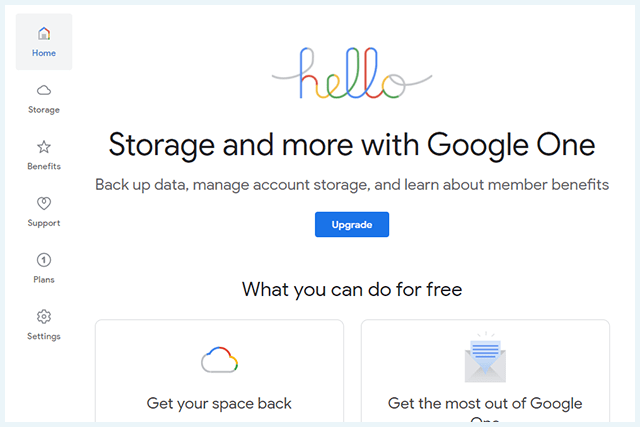
The installation process is just as straightforward, taking just a few minutes to install the Google One app. On your device, follow these steps:
- Visit the official VPN by Google One web page.
- Tap “Get Google One” to go to the Google One app in the Google Play Store.
- Tap “Install.”
- Once installation completes, launch Google One.
- Inside the app, you can select your desired Google One subscription level. Select the 2TB plan (or larger) to get the VPN.
You should have access to all of the benefits of your Google One plan once the payment takes effect. Under the Home tab, scroll down to the dialogue box that reads “Online protection with a VPN” and tap “Enable VPN”. This will take you to the VPN’s menu.
Appearance and ease-of-use
The Google One app uses the same minimal design used by all other Google services. All of the features are clearly displayed and labeled without any extraneous visual elements, so navigating through the app’s various menus is simple enough for even a first-time VPN user. The VPN doesn’t have many settings or menus to begin with, so using the VPN could hardly be easier. It’s just one toggle.
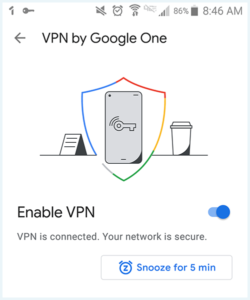
The settings are located within the Google One app itself, but can’t be accessed directly from your device’s menu. Follow the steps given below to navigate the VPN’s settings:
- Upon launching the app, click on the VPN under the dialog box that reads “Online protection with a VPN.” This is found among other boxes related to Google One services.
- It will open the VPN menu with a button labeled Enable VPN prominently displayed in the center of the screen.
- Click the Enable VPN button to automatically connect you to a VPN server right away.
From here, using the VPN is straightforward. Although it isn’t difficult to go through the Google One app to get to the VPN, it would be a more user-friendly tool if it did not require scrolling through another app’s menus to access it.
Pricing
One of the bigger disadvantages of the Google One VPN is that you can only purchase it with a paid subscription to Google One’s premium cloud storage services. The VPN is included with the purchase of a Google One plan starting at 2TB of storage or more, starting at $9.99 per month or $99.99 a year.
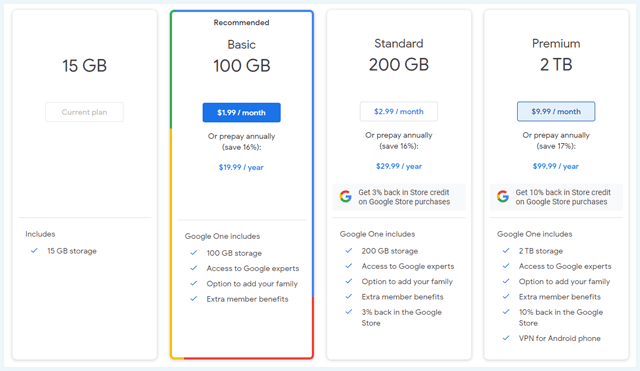
For more online storage, you can purchase a 5TB plan for $24.99 per month, a 10TB plan for $49.99 per month, and a 20TB plan for $99.99 per month. Google’s recommended plan is the 5TB prepaid annual option which saves you 17% per year, costing only $249.99 for the whole year. Any purchase of the plan will earn you a 10% savings in Google Store credit.
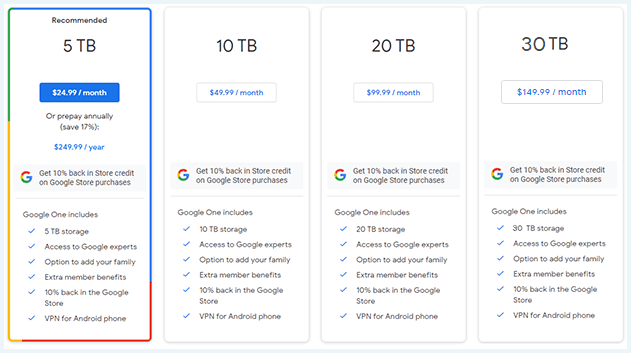
Payment method options
Since all payments are made through the Google Play Store, there is a limit on the payment method options. Payments are accepted through:
- Credit/debit cards
- PayPal
Unlike many security-focused VPNs, there is no cryptocurrency option for anonymous payment. Even if a crypto option was available, anonymous signup would not be possible in any case because it is necessary to have a Google account in order to access the Google Play Store and use Google One.
Customer service
Google One offers two exclusive customer support services for Google One subscribers. Subscribers have access to a customer support service called “Google Experts” that can be contacted over the phone, through email, or through a live chatroom. The other support option is to schedule a “Pro Sessions” meeting. These are one-on-one meetings with Google representatives who will provide personalized advice for improving your account security.
We contacted one of the Google Experts over the phone to answer a few questions regarding the VPN. Google Experts does not provide a phone number for you to call but first requires you to fill out a form containing your name, Gmail address, phone number, and your question. About five minutes after submitting the form we received a call from the Google representative.
The Google representative went down the list of our questions and attempted to answer them one-by-one as best as they could. The representative was professional, but a few things made us question the level of product knowledge the Google Experts have. This includes:
- We were put on hold several times so that they could consult with their peers for answers to our questions.
- The representative seemed to rely upon Google’s knowledge base to answer our questions rather than their own knowledge.
- However, the representative could not tell us where the servers were located specifically and how many servers the VPN by Google One had in total.
We were glad we could speak with a human being instead of navigating through automated phone menus, but we weren’t thrilled about Google’s customer service on the whole. Contacting Google Experts was a time-consuming and bureaucratic process that yielded some useful information, but not all of our questions were answered after we got off the line.
Google One VPN’s Server Network
Having an expansive server network with your VPN is necessary if you want to unblock geographical restrictions by routing your internet connections through the VPN’s servers in other countries. This is probably why nearly all VPNs market themselves based on the size of their server network among their other features. However, Google keeps their server information close to the vest.
It’s not clear on the company’s website where all of their servers are located. In fact, it took a Google One subscription and a customer support call to ask Google about its servers. Even then, they just answered with the 18 countries where Google VPN is available instead of with actual server locations. On top of that, it is still not known how many servers are available and how many each country has available.
Servers and locations
While fast connection speeds are good news, the lack of a server list leaves us in the dark regarding the servers themselves. The websites we used in our speed and leak tests showed that our VPN connected to servers in Kansas, Iowa, and Chicago. Given Google’s headquarters in the United States, it comes as no surprise that many of its servers are located in the same country. But where are the others located?
We reached out to Google Experts to get to the bottom of this, but even then, we weren’t given a clear answer. Google Experts told us that this VPN is only supported in 18 countries at this time. These countries are:
- Austria
- Belgium
- Canada
- Denmark
- Finland
- France
- Germany
- Iceland
- Ireland
- Italy
- Mexico
- Netherlands
- Norway
- Spain
- Sweden
- Switzerland
- United Kingdom
- United States
Since our tests from the United States only connected us to US servers, it seems likely to expect that each country where Google VPN is available is also offered in its server network. Likely, servers are assigned based on speed and proximity to your location. However, there is no way to confirm this, as Google Experts didn’t give us a straightforward answer.
While access to 18 countries would be pretty decent for some users, the fact that you can’t choose your server is severely limiting. This means that you cannot unblock geographically restricted content at will.
Dedicated IP address
This VPN has no option for obtaining a dedicated IP address. The server selection mechanism is automatic, so you get a new IP address and server every time you connect to the VPN.
Google One VPN’s Options Summary
The Google One VPN is apparently intended to be something of a bonus to a Google One subscription given the fact that it can’t be purchased individually. While it’s a shame Google’s VPN is lacking in some of the most basic features, it’s important to reiterate that the service is ostensibly not intended to be a full service just yet–although Google does plan on expanding its capabilities. Some most noticeable things to realize when considering the Google One VPN are:
- Google One VPN is only available as part of a premium Google One cloud storage subscription.
- Streaming platforms do not seem to work with this VPN, including Hulu.
- Currently, the only options are a snooze feature, a kill switch, and split tunneling.
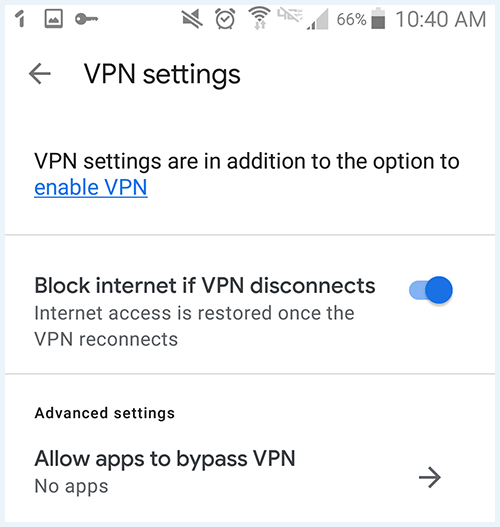
Split tunneling
The split tunneling feature allows the user to select individual apps to be exempt from the encrypted tunnel. This can come in handy if the VPN interferes with some websites or apps or prevents you from accessing local content. There is no option to select individual websites for bypassing the VPN like with some other services. Google’s split tunneling feature works on a blacklisting basis, or by selecting which apps to exclude from the VPN tunnel while sending all other traffic through the VPN by default. The opposite option is not available, which could otherwise be useful for users who only need a VPN for certain apps. The VPN needs to restart after you’ve selected which apps to bypass, but the connection is re-established in seconds.
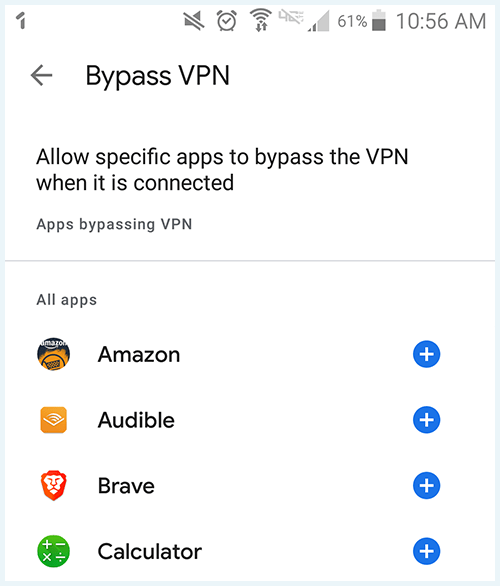
Snooze
The snooze feature deactivates the VPN for five minutes and displays a countdown until the automated reconnection time. Activating the snooze feature produces two additional buttons, the first of which adds five more minutes to the counter and the other is the End Snooze button.
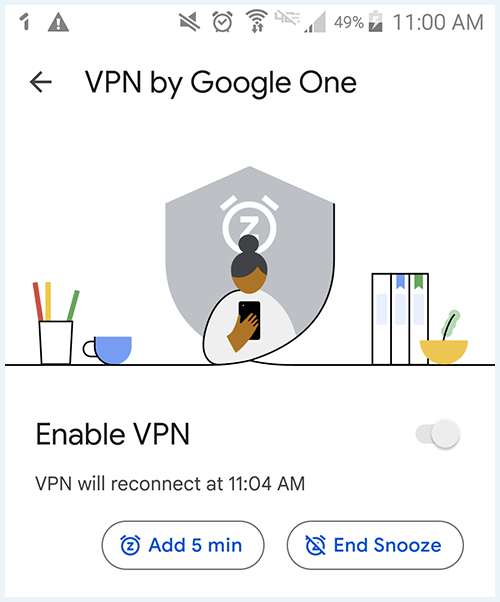
Google One VPN and streaming
This VPN isn’t much use if you’re trying to bypass other countries’ geographic restrictions. The Google One VPN webpage claims that you can hide your IP address and use the VPN to “browse, stream, and download content with a secure and private connection,” but adds the following footnote: “You won’t be able to change your IP location to view content that is not available in your region.”
Hulu and BBC iPlayer’s proxy detection systems screened out the Google One VPN when we attempted to access their platforms. Hulu immediately detected that we were using a VPN to access the service and blocked us, whereas BBC iPlayer filtered us out because only users in the United Kingdom are eligible to access the platform.
- This VPN doesn’t stand up against proxy detection systems on streaming platforms.
- There is no information about any of the servers, including where they are or how many are on Google’s network.
- There is no way to choose your server as the VPN automatically selects one for you.
Google One VPN and torrents
Nowhere in this VPN’s documentation does Google mention torrenting or P2P networks. We can’t guarantee that this VPN will shield your identity while using a P2P network, so we don’t recommend it for this purpose. We don’t condone illegally downloading copyrighted content under any circumstances, but downloading from a legal P2P network without a VPN can still be hazardous.
If using torrents is your main reason for using a VPN, we recommend taking a look at our list of the top three VPN providers for torrenting. NordVPN occupies the number one spot on this list because of its rock-solid security, stable connection speeds, and its selection of dedicated P2P servers.
Conclusion – Is The Google One VPN Worth the Money?
The Google One VPN is still in its infancy and exists as an extra feature bundled with a larger product. In all likelihood, it will mainly be used by business owners who need several terabytes of Google storage space to run their operation and incidentally take a liking to the complementary VPN. But since it’s so light on features, even subscribers of Google One may not have much use for it. The exact number of Google’s VPN servers remains a mystery, but at least the Google One VPN delivers a fast connection with no noticeable latency, even when streaming HD video.
While its accessibility and application are limited at the moment, the Google One VPN service continues to evolve and shows a lot of promise to become a worthwhile competitor to other US-based VPNs, although its location in the United States still keeps it from being one of our highest-rated VPNs. Even if the Google One VPN blossoms into a full service in the future, Google’s history of privacy violations will give pause to those who want to use a VPN for security purposes. It’s a wise option if you’re already using Google One, but it’s just not worth it if you’re only going to pay the premium for the VPN service. Especially since NordVPN outperforms Google One VPN in all aspects.
There’s a lot to consider before you decide to use the Google One VPN. We’ve answered some of the most frequently asked questions about this VPN below.
The Google One VPN meets a high standard of security according to a commissioned third-party audit. While the audit revealed no abuses or serious vulnerabilities in the VPN, Google’s past history of breaching their users’ privacy cast doubts on the VPN’s reliability.
Yes, but there is no option to select your location. The VPN automatically connects you to a server based in the United States.
Furthermore, the official Google One VPN webpage states the following: “You won’t be able to change your IP location to view content that is not available in your region.”
No. The Google One VPN comes with a purchase of a Google One subscription equal to 2TB of storage space or higher.
